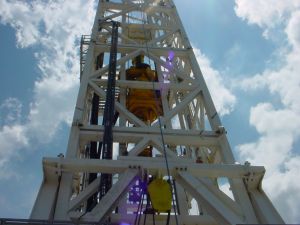Lucrative U.S. Oil Industry Draws Workers, Increases Accident Risks
Reports from the International Energy Agency indicate that the U.S. is poised to surpass Saudia Arabia in oil production in the next eight years, with hopes of being energy independent within a decade. 
Our San Antonio injury lawyers know this is good news overall for the industry and the country. However, it’s inevitably going to mean a spike in accidents as well, particularly if petroleum companies grow without careful regard to implementation of safety procedures.
According to the U.S. Energy Information Administration, crude oil production in the U.S. soared by 14 percent from 2008 to 2011. During that same time, natural gas production increased by 10 percent.
Global energy demand over the next 23 years is expected to balloon by more than a third, with demand for oil in the Middle East, India and China driving about 60 percent of that growth. This will drive up prices, as well as the need for more workers to help domestic companies produce.
The U.S. is unique in this regard in that in comparison to other burgeoning oil-rich countries, such as Singapore, we have a greater crop of experienced workers. Those with chemical and engineering backgrounds are becoming more and more important.
As of right now, many of those wells and platforms are based in the Gulf of Mexico, off the shores of Texas, Louisiana, Mississippi, Alabama and Florida. However, the demand may push some companies to press forward in exploring new frontiers such as Alaska and new offshore zones.
Around the world, there were an estimated 540 offshore oil rigs last year. By the end of this year, we’re expecting that number to grow by more than 50. By the end of next year, we can expect another 30 or so. This is going to mean that over the next year to year-and-a-half, we’re looking at another 11,000 new jobs, with about 185 employees stationed on each rig.
Even the least skilled on these rigs are making between $18 and $20 an hour, making it a job for which people are clamoring.
But skilled labor is tougher to find. The demand may mean that those with lesser experience will be pushed faster up the ranks, increasing the potential for accidents and injuries.
Additionally, some of the most lucrative operations – i.e., deepwater drilling – are also some of the most dangerous.
Still, a report from the Deepwater Horizon Study Group at the University of California, Berkeley, indicates that both deepwater and shallow water projects pose significant risks of blowouts, explosions, spills, fires and worker injury.
During the Congressional hearings held after the Deepwater Horizon spill, oil executives testified they cut cost and consequently safety measures were not up to regulation standards. Even before the explosion and spill, you had workers suffering from burns, head injuries, broken bones and death. Most commonly, these injuries were sustained due to faulty grating, faulty blocks or cables, wet or obstructed walkways or cathead slips.
When these workers suffer an injury, it’s often devastating to the person’s entire family. Seeking compensation for medical bills, lost wages and other damages is critical.
If you’ve been injured in an oil rig accident, you may be entitled to compensation. Contact the Herrera Law Firm at 800-455-1054 for a confidential consultation.




